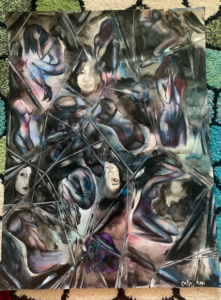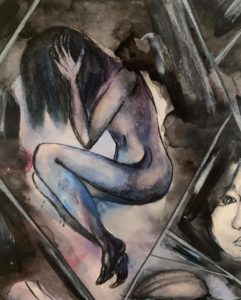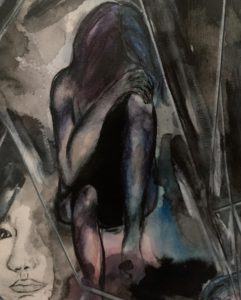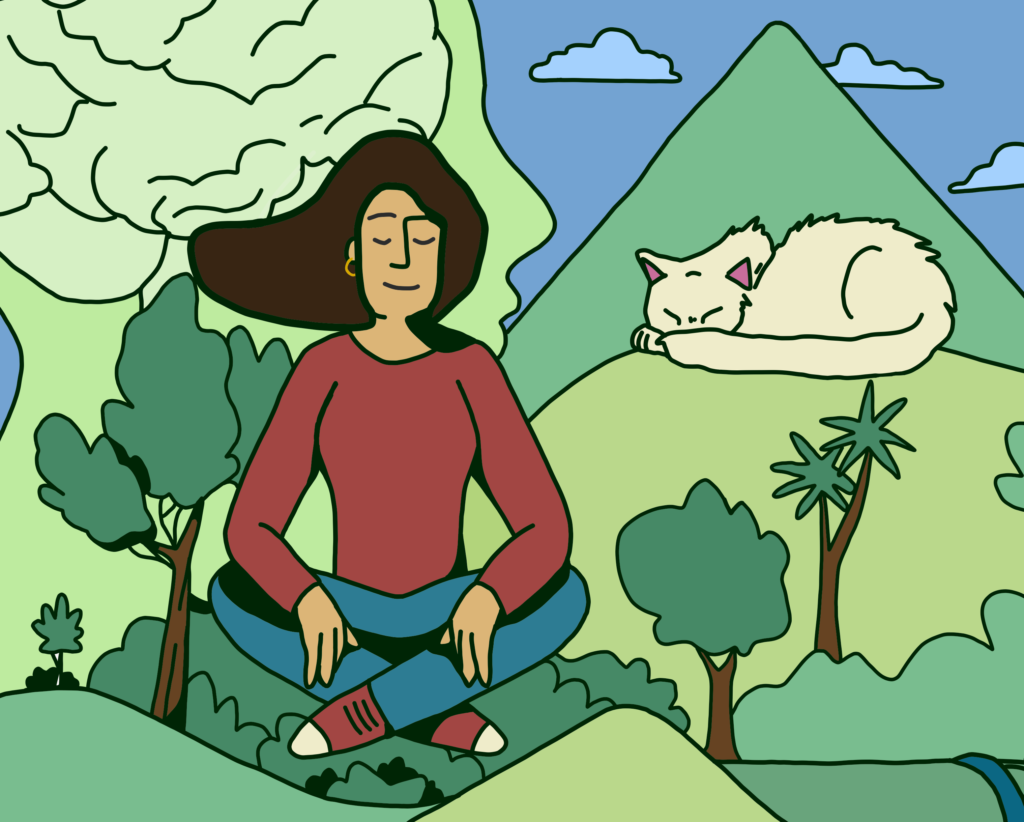By Alanis Gonzalez
gonzalez@grinnell.edu
I wouldn’t necessarily call myself an artist, but I have dabbled in drawing. In high school I used to love doing drawings in charcoal, and to this day I still love art that uses line work to its advantage to create texture. (I just read “Stage Dreams” by Melanie Gilman in an English class on the graphic novel that uses line work exquisitely, would highly recommend). During quarantine, I revisited my acrylics phase from freshman year and began to paint mythological figures and symbols in deep pastels, mostly because the colors relaxed me. I wouldn’t call it my main medium of relaxation: words nourish me more than anything, whether they are born from my mind or the imagination of others. This week, however, I talked to Celia Meagher `23, whose art has helped her navigate the highs and lows of her mental health.
I met Celia through the English class I’m currently enrolled in, ENG-210: The Graphic Novel. We’ve analyzed stories both from a literary and artistic lens, and one text in particular, “The Low, Low Woods” by Carmen Maria Machado, has inspired Celia’s final comic project. “It took something that is really unfortunately normalized, which is rape culture,” she said. “And it reminded me of how I could do something similar with that about my own experiences with mental health and create a personification of how the pandemic affected me.”
Celia has been practicing her art through various media since elementary school, she tells me, but only recently has begun to use it to help heal through her experiences. “The end of my senior year was a really tough time for me, so then that summer I started really focusing more on art as a way of channeling my emotions and making sense of what I was going through.”
While we talk over Zoom, she shows me a mixed media project titled “Portrait of My Depression.” The details were gorgeous; my mind wandered across the piece as I saw fragments of faces, bodies, all pieced together in beautiful chaos. She’s incredibly talented. I tell her this, and she gives me an incredibly modest thank you.

“Would you mind sharing with me what mental health issues you’ve had to combat in the last few years?” I wanted to make sure that Celia felt comfortable sharing, especially since we were on the record, and although I now feel comfortable admitting my diagnosis, I didn’t want to pressure her to admit hers. Celia, without hesitation, jumped right in and told me her story.
Celia suffers from extreme anxiety and depression, as well as insomnia as a result. “It makes it really difficult to function sometimes because there are days and I just never fall asleep.” Later, she was diagnosed with panic disorder. Throughout this experience of diagnosis, she has sought out various methods of self-care: she has accommodations to live alone on campus and she has an emotional support animal, a beautiful five-year-old cat named Romeo who jumped into the Zoom camera right as she mentioned him. Journaling and art, however, remained her primary outlet to keep her mind engaged and to sort through her feelings.
As Celia spoke, I couldn’t help but notice various similarities in our stories. Even the way she described how her anxiety felt and the mechanisms of her thoughts echoed feelings I’d had from a young age. We laughed at how difficult it was to explain the lack of logic behind intrusive and automatic negative thoughts. Like me, Celia had also avoided medication for a long time, trying natural remedies such as diet management and herbal supplements, but nothing seemed to work for her.

After the evacuation of campus last spring, similar to my own experience, Celia’s mental health reached a low. “Mostly I’ve been working to keep myself in a safe environment. … I moved a lot. I moved like four or five times, just kind of bouncing around.” As the school year comes to a close, Celia chats with me from Loose Hall on campus, where she’s been since S1.
The honesty and humility that Celia expressed left me feeling warm on Wednesday morning. And of course, I’m now even more excited to see how her final comic project comes out. How does Celia visualize her mental health? How would it manifest using all the techniques we’d learned throughout S2? Given the art piece she showed me that hung on her dorm room wall, I had full confidence that whatever the result, it would be introspective and beautiful.

Another lingering thought followed me around after our conversation as well: Celia’s bravery when speaking in class surpassed mine completely. Whenever I talk in class, I have to brace myself, take a deep breath, find something to fidget with and even still I’ll talk too long or I’ll stutter or I’ll lose my train of thought. I try to hide it but I’m filled with dread every time I make another comment. Celia always seems so confident, and her ideas concerning the books we read are complex and interesting. She never even seems nervous. And yet, I’d learned in the last hour that Celia and I share the experiences and sentiments that I’ve discussed with all of you thus far throughout this column.
As the school year comes to a close, and we all go off into our summer vaccinated (hopefully), and as we brace ourselves for whatever comes next, I want to leave you with this: never assume you know the whole story. Every mind is its own world, every life a series of paths and forks in the road that none of us will ever fully know. Take care of those you love, those you’ve only just met, be understanding, be kind, because the person next to your camera on a Zoom call could feel exactly how you’re feeling.
Empathy. Empathy is what I want for all of us. And of course, active listening. These are things to remember now, and into the future, on the occasion that we as a student body are all together again.
Any opinions expressed through columns and other S&B opinions publications belong to the writer and do not reflect the views of any or all members of The S&B staff, nor by any Grinnell associated organization.
























































